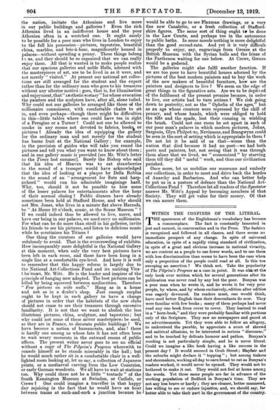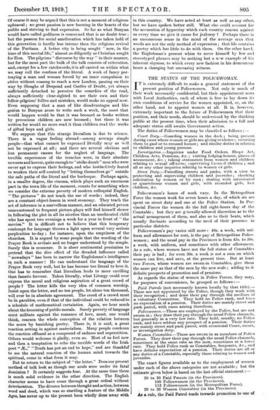WITHIN THE CONFINES OF THE LITERAL. T . sparseness of the
Englishman's vocabulary has become a commonplace. The fact is constantly lamented in jest and earnest, in conversation and in the Press. The fashiom is recognized and followed in all classes, and there seems no immediate prospect of any change. In spite of universal education, in spite of a rapidly rising standard of civilization, in spite of a great and obvious increase in national vivacity, we are content as a people to use fewer words, and to use them with less discrimination than seems to have been the case when only a proportion of the people could read at all. Is this too sweeping an assertion' We think not. Take the popularity of The Pilgrim's Progress as a case in point. It was alralst the only book ever written which for several generations after its publication was never read by any but the poor. Bunyan was a poor man when he wrote it, and he wrote it for very poor people, by whom, and by whom exclusively, edition after edition was eagerly devoured. Its readers must, one would think, have used better English than their descendants do now. They were familiar with few books ; many of them perhaps had never read any one book from cover to cover. They learned to read in a " horn-book," and they were probably familiar with portions only of the Scripture. They saw no newspapers and gazed at no advertisements. Yet they were able to follow an allegory, to understand the parable, to appreciate a score of shrewd and satirical allusions, to be interested in serious " discourse," and to be touched by delicate humour and pathos. Bunyan's wording is not particularly simple, and he is never literal. Could we imagine a like book having a like success in the present day ? It would succeed in Grub Street ; Mayfair ani the suburbs might declare it " topping " ; but among tinkers and shoemakers, working all day to earn bread to eat as Bunyan's readers worked, it would never be opened. They would not be bothered to make it out. They would not feel at home among the words. Yet these same people are far in advance of the working population of Bedford in Bunyan's time. They are not any less brave or hardy ; they are cleaner, better mannered, less willing to see or endure injustice, and, we should saY, far better able to take their Dart in the government of the country. Of course it may be argued that this is not a moment of religious upheaval ; no great passion is now burning in the hearts of the public and striving to find expression. So far as what Bunyan would have called godliness is concerned that is no doubt true ; but the passion for social amelioration which has taken hold of this generation is hardly less intense than the religious revival of the Puritans. A better city is being sought " now, in the time of this mortal life," almost as diligently as Christian sought for Zion. The pilgrims " discourse by the way " in their manner, but for the most part the bulk of the talk consists of reiteration, and, except for a few catchwords, it is all carried on within what we may call the confines of the literal. A work of fancy portraying a man and woman forced by an inner compulsion to strive without ceasing to reach a new London, passing on their way by Sloughs of Despond and Castles of Doubt, yet always sufficiently detached to perceive the comedies of the road, always sufficiently clear-sighted to see their own and their fellow-pilgrims' follies and mistakes, would make no appeal now. Even supposing that a man of like disadvantages and like genius to Bunyan arose to write such a work, the most that would happen would be that it was boomed as books written by precocious children are now boomed ; but those it was written for would no more read it than children read the works of gifted boys and girls.
We suppose that this strange literalism is due to science. There is a vague feeling abroad—among average simple people—that what cannot be expressed literally miy as well not be expressed at all ; and there are several obvious and less permanent causes for the neglect of language. The terrible experiences of the trenches were, in their absolute newness and horror, quite enough to "strike dumb " men who were never apt to express their feelings, and who instinctively feared to _weaken their self-control by "letting themselves go" outside the safe paths of the literal and the burlesque. Perhaps again, in a smaller degree, the cinema, which plays such an enormous part in the town life of the moment, counts for something when we consider the extreme poverty of modern colloquial English. " The pictures " do not teach the use of words ; indeed, they are a constant object-lesson in word economy. They teach the art of inference in a marvellous manner, and an educated person unaccustomed to frequent picture-plays will fmd himself slower in following the plot in all its niceties than an uneducated child who has spent two evenings a week for a year in front of " the movies." It is difficult not to believe that this temporary contempt for language throws a light upon several very serious perplexities to-day ; for instance, upon the emptiness of the churches. It is argued by some people that the wording of the Prayer Book is archaic and no longer understood by the simple. Surely this is nonsense. It is sheer sentimental pessimism to pretend that the dire effect of the dreaded influence called " nowadays " has been to narrow the Englishman's intelligence in such a manner! He can understand the language of the Prayer Book very well, but he has become too literal to love it. One has to remember that literalism leads to more cavilling than fanatic fervour. Taken literally, what Liturgy could ever express the moral and religious aspiration of a great crowd of people ? The letter kills the very idea of common worship. Insist upon the letter, and no ten people, let alone ten thousand, will ever be in absolute agreement. The creed of a crowd must be In: parables, even if that of the individual could be reduced to a schedule of mathematical certainties. Again, we hear muoh about the loosening of public morals. Surely poverty of language must militate against the romance of love, must, one would think, coarsen the whole conception of the relation between the sexes by banishing poetry. There is, it is said, a great reaction setting in against materialism. Many people condemn the reaction offhand as a compound of sadness and superstition. Others would welcome it gladly, even so. Most of us feel now and then a temptation to echo the terrible words of the Irish poet "IE.," "Truth has put an end to hope," and are thankfur to see the natural reaction of the human mind towards the spiritual, come in what form it may.
But to return to the subject of " the letter." Does our present method of talk look as though our souls were under its fatal dominion ? It certainly suggests fear. At the same time there is much solid evidence in the other direction. The English character seems to have come through a great ordeal without deterioration. The divorce between thought and action, between word and deed, which was so startling a feature of the Middle Ages, has never up to the present been wholly done away with in this country. We have acted at least as well as any other, but we have spoken better still. What else could account for the accusation of hypocrisy which each country renews against us every time we give it cause for jealousy ? Perhaps there is an unconscious sense in the mind of the average man that words are not the only method of expression ; that life contains a poetry which has little to do with them. On the other hand, the Englishman's present whim to serve himself by few an-1 stereotyped phrases may be nothing but a n^w example of his inherent shyness, to which every new fashion in his demeanour bears a changing but unceasing witness.



















































 Previous page
Previous page